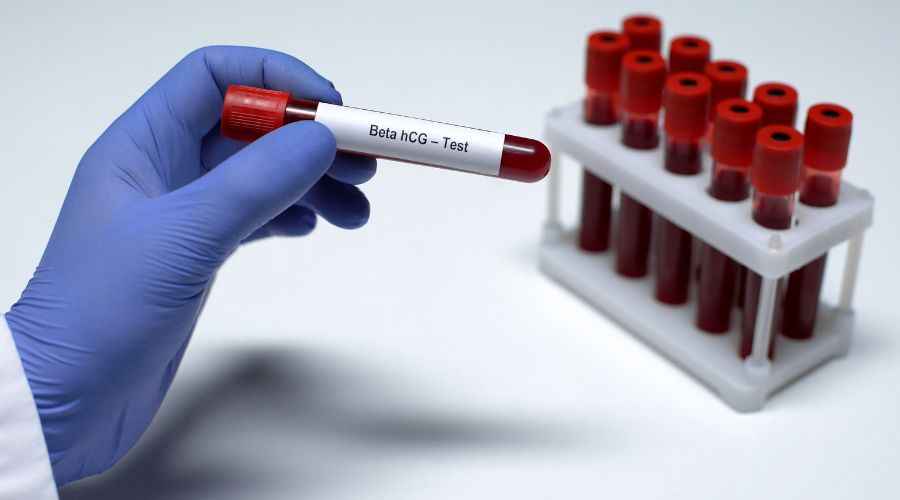10 Factors Affecting HCG Beta Test Results

Medically Reviewed By
Dr Sohini Sengupta
Written By Kirti Saxena
on May 3, 2024
Last Edit Made By Kirti Saxena
on Jul 19, 2025

The hcG beta test got its name from the component being tested. Also known as human chorionic gonadotropin, hCG is released by the body when a female is pregnant.
Many different names call the HCG beta test, which may confuse people often.
Some of the other names it can be called by are:
- Quantitative Blood Pregnancy Test
- Quantitative hCG Blood Test
- Quantitative Serial Beta-hCG Test
If you encounter any of these tests or have been recommended to get them done, it simply means that your doctor wants you to test your HCG levels.
Before learning about the hcg test, let’s understand everything about the hcg hormone.
What is HCG?
HCG is a hormone secreted from the developing placenta during a female’s pregnancy.
The hormone traces can be found in the body after 11 days of conception, and this level of HCG keeps increasing every 72 hours. The HCG content reaches its peak when it has been 11 weeks since conception, and this level of HCG starts to decline after it has reached its peak.
HCG plays a crucial role in increasing the production of progesterone and estrogen in the body. Together, these help thicken the uterine lining and stop the release of eggs, thus pausing the menstrual cycle for the time being.
Normal Range of HCG in the Body:
If you have been asked to take the HCG test, you must know the normal range in which your HCG level should lie so that you can also understand your reports.
- HCG level in a non-pregnant woman: less than five mIU/ml
- HCG level in males: less than two mIU/mL
- HCG level in a pregnant woman: 5-72 mIU/ML (3 weeks) and 170,409 mIU/mL (11 weeks).
If there is an abnormal hike in the levels of HCG in a male or non-pregnant woman’s body, it might mean there is the presence of a malignant tumor. There are types of tumors that produce HCG, so the condition needs to be taken seriously.
Why is the HCG test performed?
The HCG beta test is performed to determine:
- Age of the fetus
- Any abnormalities
- Diagnose Down syndrome.
- Miscarriages
The HCG beta test is performed in two ways, i.e., the urine and the blood test.
- HCG Urine Test: It is the normal pregnancy test that anyone takes at home. In this method, the person needs to pee on the stick, and if there are traces of HCG in the urine, the test result will be positive.
- HCG Blood Test: It is like most other blood tests. However, hcg blood test results are much more accurate than urine test reports. This is why doctors recommend getting a blood test to confirm the presence of the hormone. The blood is taken from your veins and then taken to the lab for the test.
Factors that may affect the HCG Beta Reports:
- Gestational Period: hCG levels vary throughout pregnancy, so the gestational age at the testing time can influence results.
- Timing of Testing: The time of day when the test is conducted can impact hCG levels, which are typically higher in the morning.
- Multiple Pregnancy: Carrying more than one fetus can result in higher hCG levels compared to a singleton pregnancy.
- Gestational Trophoblastic Disease: Conditions like molar pregnancies or choriocarcinoma can cause abnormal hCG levels.
- Medications: Certain medications, such as fertility drugs containing hCG or medications, can affect hormone levels and test results.
- KIdney Function: Impaired kidney function can affect the clearance of hCG from the body, leading to elevated levels.
- Hydration: Dehydration can concentrate hCG levels in the blood, potentially affecting test results.
- Lab: Differences in assay sensitivity and specificity between laboratories can lead to variations in reported hCG levels.
- Miscarriage or Termination of Pregnancy: Recent miscarriage or termination of pregnancy can cause lingering hCG levels in the body, affecting test results.
- Health Conditions: Certain health conditions, such as ovarian cysts or ectopic pregnancy, can influence hCG levels and, thus, test results.
These few factors can change or modify the test results, so it is always recommended to be cautious and mindful before taking the test.
Conclusion:
In summary, the hCG beta test is a valuable tool for monitoring pregnancy and diagnosing certain medical conditions. However, various factors can influence its accuracy. The timing of the test is critical, as hCG levels fluctuate throughout pregnancy, peaking around 8-11 weeks before gradually declining. Early testing may yield false negatives, while late testing may miss important diagnostic windows.
Additionally, medications such as fertility drugs containing hCG medications interfere with hormone levels and test results. Medical conditions like ectopic pregnancy or gestational trophoblastic disease can also impact hCG levels, leading to misleading results if not considered.
Laboratory techniques and equipment calibration play a role as well. Variations in assay sensitivity, specificity, and calibration methods can contribute to discrepancies in results among different laboratories.
Healthcare providers must carefully interpret hCG beta test results, considering these factors alongside clinical symptoms and other diagnostic tests. Clinical judgment remains crucial in ensuring accurate diagnosis and appropriate patient management. Awareness of these influencing factors enhances the utility and reliability of hCG beta testing in clinical practice.
If you're looking for a reliable lab to get your HCG beta test, you can opt for Redcliffe Labs. You can get our doorstep sample collection service to skip the hassle of waiting in queues to get tested.


